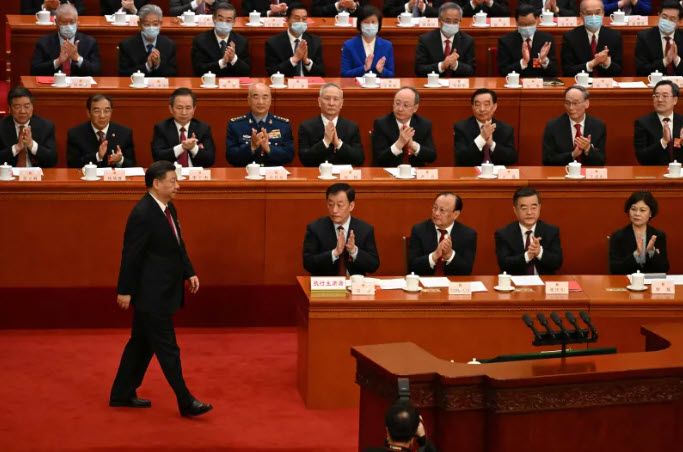
Xi Jinping Says He Is Preparing China for War
By John Pomfret and Matt Pottinger
29 March 2023
Chinese leader Xi Jinping says he is preparing for war. At the annual meeting of China’s parliament and its top political advisory body in March, Xi wove the theme of war readiness through four separate speeches, in one instance telling his generals to “dare to fight.” His government also announced a 7.2 percent increase in China’s defense budget, which has doubled over the last decade, as well as plans to make the country less dependent on foreign grain imports. And in recent months, Beijing has unveiled new military readiness laws, new air-raid shelters in cities across the strait from Taiwan, and new “National Defense Mobilization” offices countrywide.
It is too early to say for certain what these developments mean. Conflict is not certain or imminent. But something has changed in Beijing that policymakers and business leaders worldwide cannot afford to ignore. If Xi says he is readying for war, it would be foolish not to take him at his word.
WEEPING GHOSTS, QUAKING ENEMIES
The first sign that this year’s meetings of the National People’s Congress and the Chinese People’s Political Consultative Conference—known as the “two-sessions” because both bodies meet simultaneously—might not be business as usual came on March 1, when the top theoretical journal of the Chinese Communist Party (CCP) published an essay titled “Under the Guidance of Xi Jinping Thought on Strengthening the Army, We Will Advance Victoriously.” The essay appeared under the name “Jun Zheng”—a homonym for “military government” that possibly refers to China’s top military body, the Central Military Commission—and argued that “the modernization of national defense and the military must be accelerated.” It also called for an intensification of Military-Civil Fusion, Xi’s policy requiring private companies and civilian institutions to serve China’s military modernization effort. And riffing off a speech that Xi made to Chinse military leaders in October 2022, it made lightly veiled jabs at the United States:
In the face of wars that may be imposed on us, we must speak to enemies in a language they understand and use victory to win peace and respect. In the new era, the People’s Army insists on using force to stop fighting. . . . Our army is famous for being good at fighting and having a strong fighting spirit. With millet and rifles, it defeated the Kuomintang army equipped with American equipment. It defeated the world’s number one enemy armed to the teeth on the Korean battlefield, and performed mighty and majestic battle dramas that shocked the world and caused ghosts and gods to weep.
Even before the essay’s publication, there were indications that Chinese leaders could be planning for a possible conflict. In December, Beijing promulgated a new law that would enable the People’s Liberation Army (PLA) to more easily activate its reserve forces and institutionalize a system for replenishing combat troops in the event of war. Such measures, as the analysts Lyle Goldstein and Nathan Waechter have noted, suggest that Xi may have drawn lessons about military mobilization from Russian President Vladimir Putin’s failures in Ukraine.
The law governing military reservists is not the only legal change that hints at Beijing’s preparations. In February, the top deliberative body of the National People’s Congress adopted the Decision on Adjusting the Application of Certain Provisions of the [Chinese] Criminal Procedure Law to the Military During Wartime, which, according to the state-run People’s Daily, gives the Central Military Commission the power to adjust legal provisions, including “jurisdiction, defense and representation, compulsory measures, case filings, investigation, prosecution, trial, and the implementation of sentences.” Although it is impossible to predict how the decision will be used, it could become a weapon to target individuals who oppose a takeover of Taiwan. The PLA might also use it to claim legal jurisdiction over a potentially occupied territory, such as Taiwan. Or Beijing could use it to compel Chinese citizens to support its decisions during wartime.
Since December, the Chinese government has also opened a slew of National Defense Mobilization offices—or recruitment centers—across the country, including in Beijing, Fujian, Hubei, Hunan, Inner Mongolia, Shandong, Shanghai, Sichuan, Tibet, and Wuhan. At the same time, cities in Fujian Province, across the strait from Taiwan, have begun building or upgrading air-raid shelters and at least one “wartime emergency hospital,” according to Chinese state media. In March, Fujian and several cities in the province began preventing overseas IP addresses from accessing government websites, possibly to impede tracking of China’s preparations for war.


